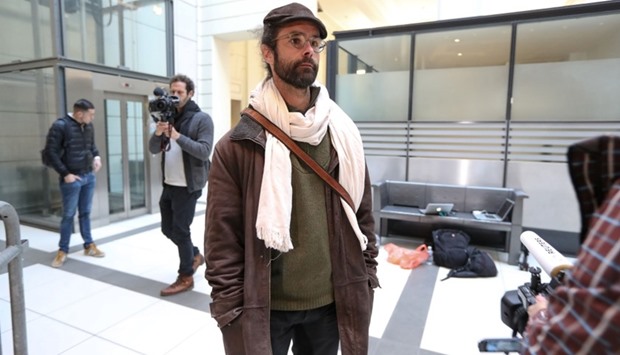Cedric Herrou, 37, is one of three people to appear before the courts in southern France for assisting migrants fleeing war, poverty and persecution to Europe.
Accused of "helping undocumented foreigners enter, move about and reside in" France, he risks up to five years in prison and a 30,000-euro ($31,300) fine if convicted.
Herrou's olive farm sits in a valley on the border of France and Italy, near a popular route for migrants trying to slip past French border controls.
He has been unapologetic about helping migrants travelling up through Europe after crossing the Mediterranean in rickety boats that regularly sink.
"If we have to break the law to help people, let's do it!" he told supporters outside the Nice courthouse on Wednesday, where a crowd of around 300 people gathered.
"Our role is to help people overcome danger, and the danger is this border," he said, accusing French police of detaining "thousands" of minors and dumping them back across the border.
In October, Herrou led a group of activists who occupied a disused holiday village belonging to state railway company SNCF and opened it up to a group of migrants.
Police intervened after three days to evacuate the makeshift camp, arresting Herrou.
Two months earlier, he had been arrested for trying to smuggle eight Eritrean migrants by car from Italy into France.
That case was later dropped, with prosecutors acknowledging that he acted on humanitarian grounds.
But they have since taken a less indulgent view, accusing him of being more activist than Good Samaritan.
Herrou is part of a network of citizens and activists that have resorted to semi-clandestine tactics in assisting migrants who are regularly yanked by the police from trains crossing into France and sent back to Italy.
Outlaws for some, they have been compared by others to the French people who helped hide Jews during World War II.
A university researcher was also prosecuted in October after being caught giving a lift to three Eritrean women near Nice, shortly after their arrival from Italy.
The ruling in the researcher's case is expected Friday. Prosecutors have called for a six-month suspended sentence.
In December, a 73-year-old academic was fined 1,500 euros for a similar infringement.
burs-cb/gj/ric
Arab separatists in Iran say attacked pipelines in west, Tehran issues denial
DUBAI, Jan 4 (Reuters) - Arab separatist militants in Iran said on Tuesday they had blown up two oil pipelines in coordinated attacks in the western Khuzestan region two days earlier, though this was subsequently denied by Iran's Interior Ministry.The group, the Arab Struggle Movement for the Liberation of al-Ahwaz, said on its website its armed wing had caused major damage and fuel losses in the attacks on Jan. 3 near the town of Omidiyeh and the port of Deylam.
However, a spokesman for the Interior Ministry told state television the reports were untrue.
Ahwazi Arabs are a minority in mainly ethnic Persian Iran, and some see themselves as under Persian occupation and want independence or autonomy. Separatist groups have carried out intermittent attacks for decades, including on oil installations.
Tehran denies there is discontent among its Arab minority and has blamed suggestions of there being any separatist sentiment on a foreign plot to seize the oil that lies beneath Iran's Gulf coastal territory.
In a statement posted on their Ahwazna.net website, the group said the first attack targeted the "Maroun" pipeline of the state-owned Aghajari Oil and Gas Production Company, while the second attack targeted pipelines from the Baharkan oilfield to Kharg Island.

